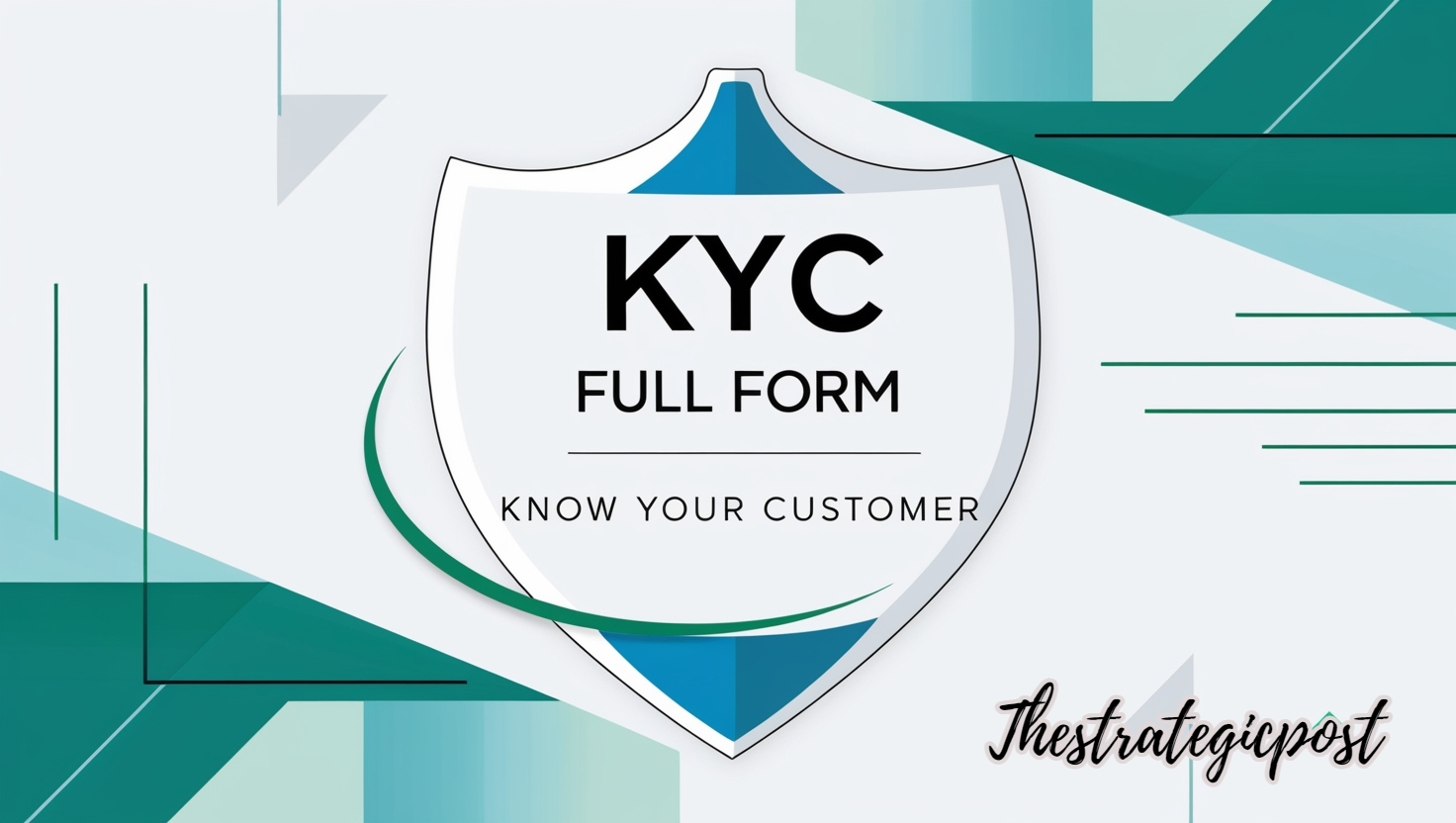KYC Full Form and Its Importance in Today’s Financial Landscape
(October 27, 2024) By Azfer.
In today’s fast-paced digital world, staying secure and verified is everything. That’s where KYC—or Know Your Customer—comes in. It’s a standard process used worldwide across finance, banking, and even tech platforms, aiming to confirm that users are who they say they are. But why does KYC matter so much? And what’s the process really about? Let’s break it down and dive into why KYC is critical in the age of digital transactions.
What Is KYC? The Full Breakdown
KYC, or Know Your Customer, is a mandatory process used by financial institutions, banks, and other regulated entities worldwide to verify a client’s identity, ensuring they’re legitimate. Originally designed to prevent financial crimes like fraud and money laundering, KYC has evolved to be a crucial part of the global financial infrastructure.
KYC procedures are standard in major economies such as the United States, the European Union, and the Asia-Pacific region. They help institutions determine and manage risks by keeping their customers’ information accurate and up-to-date, while also ensuring these customers are safe to do business with.
Why KYC Matters More Than Ever Today
The internet has transformed how we handle money. From buying crypto to opening bank accounts online, transactions have gone digital. And with this shift, security has become a top priority. That’s why KYC is now more important than ever. Here’s why KYC is crucial in today’s interconnected world:
- Fraud Prevention
KYC verification adds a protective barrier, making it much harder for fraudsters to carry out schemes. By verifying identities, financial institutions can prevent malicious activity before it even begins. - Anti-Money Laundering (AML)
One of the biggest threats to global financial systems is money laundering. With KYC, institutions can better track financial behavior, flagging suspicious transactions that don’t match a user’s profile. - Enhanced Security in Digital Banking
In a world where online banking and mobile transactions are the norm, digital platforms rely on KYC to protect user accounts and personal data, providing peace of mind to millions of users worldwide. - Improving Trust and Transparency
People want to feel safe with their financial institutions. By ensuring that everyone on their platform is verified, companies build trust with their customers, fostering long-lasting relationships.
Common Steps in KYC: How Does It Work?
KYC processes vary slightly depending on the institution, but most KYC procedures include three main steps:
- Customer Identification Program (CIP)
The first step in KYC is identification. Customers are typically asked to provide documents like a government-issued ID, proof of address, and sometimes additional documents like Social Security numbers or tax IDs. - Customer Due Diligence (CDD)
Once identification is complete, institutions conduct a background check on the client. This can include checking criminal records or reviewing the customer’s financial history to detect any red flags. - Enhanced Due Diligence (EDD)
For high-risk customers, such as foreign nationals or clients involved in large transactions, enhanced due diligence is performed. EDD digs deeper into a person’s background to make sure they’re a legitimate customer.
Industries That Use KYC Internationally
The power of KYC extends far beyond banking. From e-commerce platforms to real estate and even ride-hailing apps, KYC is employed in multiple sectors globally:
- Banking and Finance
Banks and financial institutions use KYC to verify clients before allowing them to open accounts, apply for loans, or make investments. - Cryptocurrency
Due to its decentralized nature, the cryptocurrency industry uses KYC to ensure traders are genuine. KYC helps exchanges track transactions and ensure funds aren’t used for illegal activities. - E-commerce
Online platforms use KYC to verify user identities, protecting both sellers and buyers from scams or fraud. - Real Estate
The real estate sector uses KYC to confirm buyer and seller identities, which helps reduce illegal property transactions.
The Role of Technology in KYC
With advancements in technology, KYC processes have become quicker and more efficient. AI and machine learning now enable digital verification within minutes. Here are a few tech tools revolutionizing KYC:
- Biometric Verification
Using fingerprints or facial recognition, biometric verification makes it easy to confirm identity without lengthy paperwork. It’s faster, more accurate, and ideal for today’s mobile-first world. - Automated Document Verification
With optical character recognition (OCR) and AI, documents like driver’s licenses and passports can be verified automatically, reducing human error and speeding up the KYC process. - Risk Profiling Using AI
AI can scan vast data sets to assess customer risk profiles based on their financial behaviors. This allows banks and companies to act quickly on any suspicious activity.
KYC Challenges and Solutions
Even though KYC is essential, it has its challenges. Here’s a look at some common issues and how companies are working to solve them:
- Privacy Concerns
Some customers worry about sharing personal information. Companies address this by encrypting data and ensuring only authorized personnel can access it. - Process Time
Lengthy KYC processes can deter customers, especially in digital banking. Tech solutions like AI-driven verification are helping cut down the time it takes to verify a customer’s identity. - Cost of Implementation
For smaller firms, implementing KYC protocols can be costly. However, many governments are providing support or sharing resources to make compliance easier for businesses of all sizes.
How Does KYC Benefit the Everyday User?
KYC might seem like a lot of paperwork, but the benefits to users are significant. Here’s how KYC positively impacts people in their day-to-day lives:
- Security and Peace of Mind
Users can trust that the companies they do business with have vetted other customers, creating a safer environment for everyone. - Reduced Scams and Fraud
With KYC in place, users face fewer risks of fraudulent activity, whether it’s online shopping or investing. - Better Customer Experience
With verified identities, businesses can personalize services and offer smoother, faster customer experiences.
Wrapping It Up: The Future of KYC
In a world driven by data and online transactions, KYC will only grow in importance. As more people embrace digital platforms, the need for secure, verified interactions becomes even more critical. Whether you’re opening a bank account or making a high-value purchase, KYC processes ensure that both you and the business are protected.
By 2025, KYC may become even more streamlined with advanced AI, blockchain, and biometric tech, making it faster and more efficient while protecting user privacy. So, next time you’re asked for ID verification, remember: it’s not just a formality; it’s a necessary step to keep your financial life secure in today’s globalized world.
Stay safe, stay verified, and remember—KYC is here to stay.
If you Liked Reading our Blog Read More Blogs Here and Below is the Link to our WhatsApp channel Join it for the Latest Post Updates. (Read For WhatsApp Channel Privacy and Security Here).
.Disclaimer: The information presented in this blog is for educational and informational purposes only and should not be considered financial, Political, or cultural advice. All efforts have been made to ensure the accuracy of the content at the time of writing.
Think We Missed Something?
If you notice an error or have a suggestion, we encourage you to submit a correction. Help us keep our information up-to-date and reliable!











